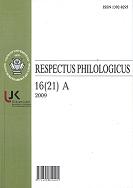MANIPULIAVIMAS ANTRAŠTėMIS: TEKSTO IR KONTEKSTO OPOZICIJA
THE MANIPULATION OF HEADLINES: THE OPPOSITION OF TEXT AND CONTEXT
Author(s): Regina KoženiauskienėSubject(s): Language and Literature Studies
Published by: Vilniaus Universiteto Leidykla
Keywords: antraštė1; pavadinimas2; ginčytinas tekstas3; idioma4; frazeologija5; lingvistinė ekspertizė6; manipuliavimas7; etinė stilistika8; tekstas9; kūno kalba10; lingvistinis ir ekstralingvistinis kontekstas11;
Summary/Abstract: The headline of a text usually shows the author’s position. Moreover, the headline is likely not only to inform but also to persuade the reader to buy this information. The media knows perfectly that the reader pays for the instant impact. Thus, the headline which is formulated in an attractive, playful, shocking, intriguing or provocative way is delivered to the reader’s consideration; however, it may happen that the headline is presented in such a way that the reader is made to accept the author’s opinion. While manipulating the reader’s attention, the author indirectly attempts to make the readers accept what the author wants himself, behave the way they would not have ever behaved if they had not faced non ethical means which are considered as manipulation. The classical headline functions as a separate rhetorical work comprising the essence. The head¬line names and describes the text; moreover, it is the rheme and theme of the text. Such headlines are defined as having close relation with the text, its content and message. This article, however, analyses such headlines which stand in conflict with the text itself and which become the focus of linguistic expertise. Incorrect and not ethical headlines which manipulate the information taken out of the context are the most controversial issues. From the stylistic point of view, the eye catching headline when the author employs different means of stylistic devices may become the focus of linguistic analysis. A linguist who encounters such texts tries to guess the mean¬ing of such linguistic games (this is the sphere of ethical linguistics), to decipher the riddle, to decode the text and to interpret its meanings and senses. However, it is impossible to manage without the context. Sometimes it is not enough to understand its verbal context, i.e. linguistic and stylistic; extralinguistic– visual, ethical, sociocultural, psychological – context comes into focus.
Journal: Respectus Philologicus
- Issue Year: 2009
- Issue No: 16 (21) A
- Page Range: 50-56
- Page Count: 7
- Language: Lithuanian

